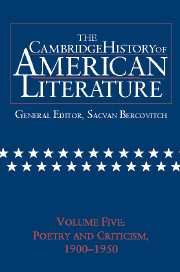Book contents
- Frontmatter
- Introduction
- MODERNIST LYRIC IN THE CULTURE OF CAPITAL
- POETRY IN THE MACHINE AGE
- LITERARY CRITICISM
- Prologue
- 1 Inventing American literature
- 2 Intellectuals, cultural critics, men and women of letters
- 3 Southerners, Agrarians, and New Critics the institutions of modern criticism
- Chronology 1910–1950
- Bibliography
- Index
2 - Intellectuals, cultural critics, men and women of letters
from LITERARY CRITICISM
Published online by Cambridge University Press: 28 March 2008
- Frontmatter
- Introduction
- MODERNIST LYRIC IN THE CULTURE OF CAPITAL
- POETRY IN THE MACHINE AGE
- LITERARY CRITICISM
- Prologue
- 1 Inventing American literature
- 2 Intellectuals, cultural critics, men and women of letters
- 3 Southerners, Agrarians, and New Critics the institutions of modern criticism
- Chronology 1910–1950
- Bibliography
- Index
Summary
Emerson and Whitman, and their contemporaries and successors in the early modern period, called for authors who would voice American democratic principles and give expression to the majesty of the land and the vigor of the nation's speech. But to a striking extent the makers of American literature invoked and pointed to European and, more often, British models, the Scottish essayist and historian Thomas Carlyle and the English poet and essayist Matthew Arnold above all.
Carlyle and Arnold were in a sense America's intellectual leaders and exemplars of critical conduct during much of the nineteenth century and into the first decades of the twentieth. This is not to discount Emerson, Whitman, and other leading American influences, but, rather, to identify the central figures from abroad, working in the English language, against whom American writers were defined and measured – the figures whom American writers would need to match in order for American literature to claim it had finally established itself.
Educated as a divinity student at the University of Edinburgh, restless and discontented as a teacher, Carlyle (1795–1881) was an incalculably important writer for Emerson and his contemporaries. His translations and selections of German authors, his exuberant and outrageous Sartor Resartus (1833–34), his epic History of the French Revolution (2 vols., 1837), and his provocative lectures On Heroes, Hero-Worship, and the Heroic in History (1841) seemed to American readers to be written to inspire and instruct transcendental poets and visionaries in America. Emerson praised Carlyle extravagantly in essays and letters, even recommending to him early in their friendship, in 1834, that he settle in America and “found a new academy that shall be church and school and parnassus, as a true poet's house should be.”
- Type
- Chapter
- Information
- The Cambridge History of American Literature , pp. 406 - 485Publisher: Cambridge University PressPrint publication year: 2003

